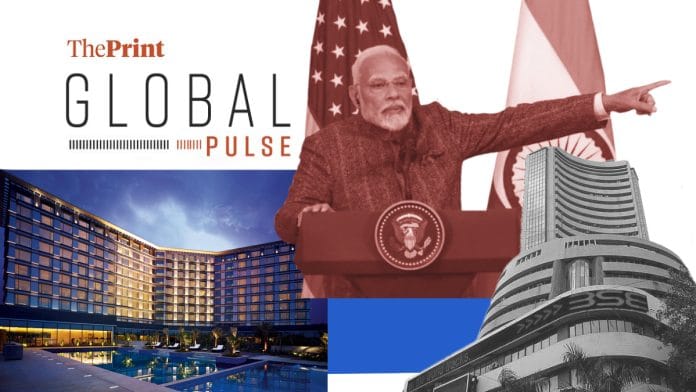New Delhi: India’s stock market has a group of saviours––Indian investors, reports Alex Travelli in The New York Times, noting that while foreign investors had checked out prior to US President Donald Trump’s declaration of “economic war on India”, the two main stock indexes in Mumbai are up 10% over the past six months and have “barely budged” since the US’ 50% tariffs took full effect.
“Indian institutional investors—mainly mutual funds and insurers—now hold a greater proportion of the market. As a result, India’s individual investors no longer take cues from international money managers who are chasing optimal returns around the world. Many automate their deposits into Indian mutual funds and just buckle in for the ride,” says the report, adding that the “number of individual brokerage accounts has exploded since 2020.”
“By this summer, there were 200 million, or one for every seven Indians. The room for growth is still immense,” writes Travelli.
In Financial Times, Chris Kay, Krishn Kaushik and Mari Novik report that Hilton and Marriott are among global hotel chains which are making inroads into tier-2 India––“to accommodate a surge in domestic travel and cater to the country’s price-conscious tourists”.
“Growing wealth among a newly minted middle class and government spending on new highways and airports have spurred wanderlust in the world’s most populous country, but the number of quality accommodations is failing to keep up with demand, said industry experts and executives,” notes the report. Domestic tourism spending rose from $80 billion in 2013 to $200 billion in 2024.
“Markets in smaller cities and towns are underserved compared with the metropolises of New Delhi, Mumbai and Bengaluru. When Coldplay performed two shows in Ahmedabad in January, a run on rooms boosted prices as much as fivefold, according to a study by pricing software company Sciative Solutions,” it adds.
In The Guardian, Mukul Kesavan writes that the “mortifying” collapse of India-US relations had “discredited” Prime Minister Narendra Modi’s global statesman image. Non-alignment might be an unfashionable term in Modi’s India, but his policy suggests otherwise––“he has tried to maintain India’s freedom of action in a multipolar world”.
“What changed was that over the past quarter of a century, India’s political class began to see the US as the country’s natural partner. It was the main destination of India’s exports and also the aspirational destination for the children of its ruling elite,” says the report.
“Since the time of Modi’s predecessor, Manmohan Singh, who signed the Indo-US nuclear deal, India has tilted towards Washington. The Quad, a grouping of four countries––Japan, Australia, the US and India––designed to foil China’s designs in the Indo-Pacific, was widely read as a sign of this westward tilt,” it adds.
BBC reports on a digital arrest case involving a Gurugram resident, noting that her case is far from unique. “Tracing her money trail exposed failures at every level of India’s top banks,” says the report by Nikhil Inamdar and Geeta Pandey.
“She alleges that the bank failed to detect red flags or trigger alerts for abnormal transactions, even though the amounts she was transferring were 200 times larger than her usual pattern of withdrawals,” it adds.
“In an email to Anjali, which the BBC has seen, HDFC called her allegations ‘baseless’ and said the incident of fraud was reported to the bank after a delay of two-three days. It added that the transactions were authorised by the bank on her instructions so its officials cannot be faulted.”
The report notes that as such scams get more complex, there are discussions worldwide about who ultimately pays for financial fraud, and what responsibility banks, financial institutions and regulators bear.
(Edited by Nida Fatima Siddiqui)
Also Read: Biden’s aides make ‘case for India-US alliance’ as Trump team escalates ‘anti-India rhetoric’






